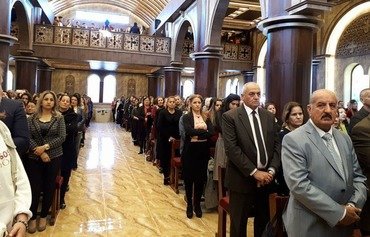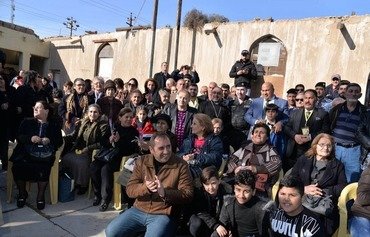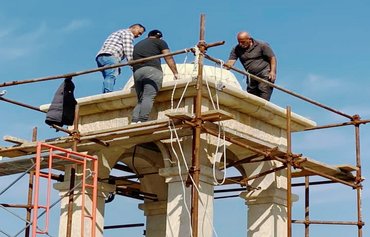With the approach of Christmas, al-Raqa Christians are celebrating with great sadness and mounting fear as they are forced to hold their rituals in secret for fear of reprisal from the "Islamic State of Iraq and the Levant" (ISIL).
Since February 2014, ISIL has imposed strict rules on Christians in al-Raqa restricting their religious freedoms.
It imposed a "jizya" tax (levied on non-Muslims) on them and made them hold their religious rituals, including celebrating their feast days, behind closed doors.
"What kind of Christmas is this that will pass without prayer? Prayer is in the heart, however, and this they cannot ban," said Jamil Mardam, a Christian and retired teacher from al-Raqa who still resides in the city.
Mardam, who asked to use a pseudonym out of fear for his safety, told Diyaruna, "The advent of Christmas brings anguish to the hearts of Christians in al-Raqa, who are trying to cope with the new situation."
"The pain we feel is caused by the fact that we cannot hold prayers in churches because ISIL has turned them into their headquarters and also prohibited prayer gatherings in homes," he said.
Al-Raqa was once home to some 300,000 people, and less than 1% were Christian. Many Christians fled the city after ISIL started attacking and burning churches.
Those who remain live in "real fear and exercise extreme caution as though they are being closely watched all the time, inside and outside their homes", Mardam said.
Banned from leaving
"In the past, Christmas and New Year celebrations were a source of joy in the city, as everyone used to decorate the streets and help decorate churches," al-Raqa resident and teacher Nasser al-Ali, who asked to use a pseudonym for fear for his safety, told Diyaruna.
"Now, however, churches do not even exist under ISIL's rule," he said.
Seven months ago, ISIL started enforcing a new ban prohibiting any Christian who remained in al-Raqa from leaving the city under no circumstances, al-Ali said.
"No Christian has been allowed to leave the city since then, no matter what guarantees he gave for his return," he said, adding that only some Muslim residents are permitted to leave the city, and even then, they had to return within a specified time period .
This tactic aims to pressure residents in general, and Christians in particular, to stay in the city and use them "as human shields" against possible future airstrikes against the group, he said.
ISIL also aims to use the Christian minority as a playing card in the event al-Raqa is besieged or after its liberation, to get its elements out of the city, he added.
Unity in the face of hardships
Many of al-Raqa's Christians, mainly Greek Orthodox, Roman Catholics and Armenians, live today below the poverty line, said resident Sami Mandour, a Christian, who asked to use a pseudonym for safety reasons.
"Those who remain are impoverished and they stayed in the city because they could not cover the cost of leaving," he told Diyaruna.
Some of the Christians left at the outbreak of the armed clashes last month , while others left when ISIL seized the city in 2014, and "those who remain now own nothing other than the home in which they live", he said.
"ISIL confiscated all their other property such as shops, agricultural lands, cars and farm tractors, and they now have no source of income other than the daily wage jobs that some work if available," he said.
A few well-off Christian and Muslim families who remained in the city are aiding the poor to help them withstand these tough circumstances, Mandour said.
"Friendships and the strong historical relationships with some of the Muslims in the city play an important role in supporting these poor families," he added.

![The 'Islamic State of Iraq and the Levant' confiscated the Church of the Lady of the Annunciation in al-Raqa and turned it into a Da'wah (preaching) office. [Photo courtesy of Mohammed al-Abdullah]](/cnmi_di/images/2016/12/22/6859-Syria-Raqa-church-600_384.jpg)






